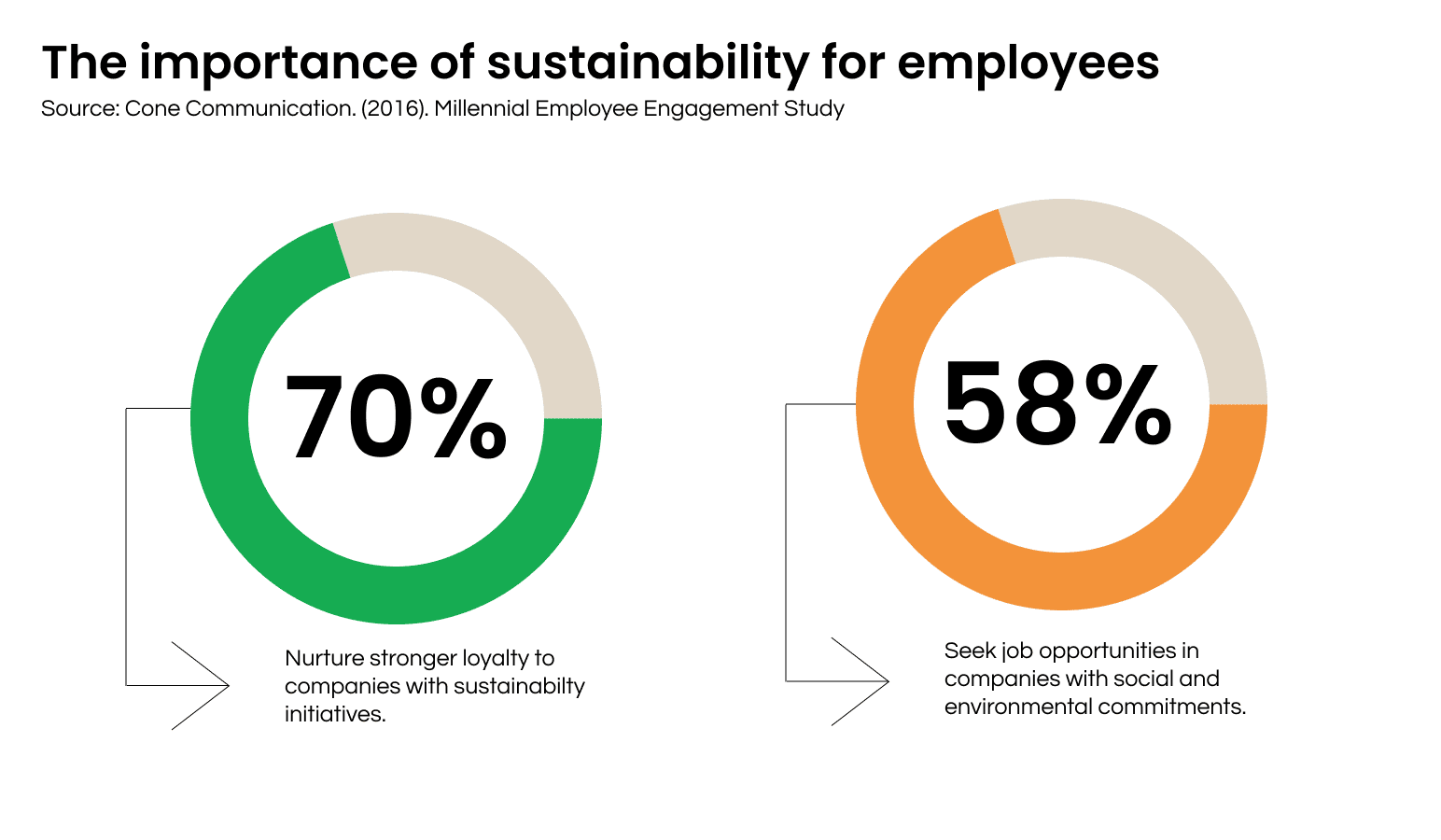 Your guide to sustainability assessment: Why choose EcoVadis?
Your guide to sustainability assessment: Why choose EcoVadis?
Public pressure is increasingly demanding companies to tackle sustainability issues caused by their business activities. Nevertheless, how can this be possible if expertise and environmental awareness are not widely spread within organisations?
Small actions make a big difference. Organisations should engage employees from the bottom up to improve sustainability planning. To do that, it is crucial to link sustainability to operations and daily work. That is where corporate sustainability training comes into place.
At the management level, sustainability training educates executives to conduct business while managing competing interests of shareholders, the planet, and society as a whole. Additionally, the training provides employees with the competencies to embed leadership in sustainability within their everyday work.
Training plays a crucial role in human resources development. It poses as a source of competitive advantage and increased efficiency, motivation, and productivity. Moreover, it is fundamental in driving corporate change by creating a uniform base of expertise for the organisation’s business goals.
If companies desire to embed sustainability reporting within their DNAs, then effective training methods are key. It creates an involved and acknowledged workforce, stimulates innovation, and ties sustainability to the way of working and thinking.
In terms of tangible benefits that companies can derive from investing in sustainability programs, the following are worth mentioning:
Through sustainability training employees understand the potential of sustainability efforts implemented by their company, thus comprehending the “business case for sustainability”. Hence, employees themselves will learn how to best embrace sustainability and shape strategies to leverage corporate sustainability performances.
Finally, experts have demonstrated that through sustainability training, the engagement of employees in environmental, social, and governance (ESG) practices notably increases.
At this point, we turn attention to the who, the why, and the how of sustainability training.
Who is sustainability training for?
The goal is simple: Creating a sustainability plan throughout the organisation.
For executives, sustainability training is crucial in developing skills and expertise. It helps them to address environmental and social issues, manage risks, and integrate sustainability KPIs within the strategy. Corporate training programs also provide executives with the key competences to be leaders and inspire change among the business structure.
Concerning that, training plays a huge part in supporting managers redirecting their organisations towards sustainability. For executives, it can be difficult to manage trade-offs between economic, environmental, social goals, other than short and long-term ones.
After integrating ESG framework within executives’ values and decisions, all employees have to be involved as well to build the change from the ground up. In conclusion, the employees should spread the sustainability strategy development across the whole organisational structure.
Read our factsheet for practical tips about organisational change management for a more sustainable future.
Engaging workers in ESG programs should not be that hard, based on the results of the 2016 survey conducted by Cone Communications:
- 70% of the respondents perceive stronger loyalty to companies involved in sustainability initiatives;
- 58% of the interviewees stated that organisational sustainability commitments are taken into consideration when looking for job opportunities.

Do you need to implement Corporate Sustainability Training?
Corporate Sustainability Training can help overcome two frequently observed gaps in sustainability management. Namely, “the knowing-doing gap” and “the compliance-competitive advantage gap”.
“The knowing-doing gap” is highlighted by a BCG/MIT study according to which 90% of executives claim to understand the importance of ESG factors. Nevertheless, only 60% of companies integrate them within their strategy and less than 25% incorporate sustainability in their business model.
The second gap, instead, refers to those companies that are addressing sustainability with a compliance-driven mindset. Particularly, the “tick in the box” approach will prevent from exploiting sustainability as a lever of competitive advantage.
Through continuous training, executives can learn why and how to root sustainability within the core of their business. In fact, ESG strategy development within the company DNA calls for a change in value systems, business practices, and strategies.
These transformations require executives that understand the importance of ESG issues for the long-term success of the organisation.
Corporate Sustainability Training in practice
When designing training programs hinged on ESG criteria, online sustainability courses can educate employees on technical standards and tools. Nevertheless, including a hands-on component in training has proved to translate into better outcomes.
Therefore, employees can be engaged in sustainability projects that enhance their knowledge on the topic and foster a forward-thinking and proactive approach.
In terms of macro topics to cover through training, the following are relevant:
1) Defining the concept of sustainability: first of all, the concept of sustainability and its meaning for businesses must be defined.
2) The value of sustainability: secondarily, the importance of sustainability for businesses’ success and long-term survival has to be explained. Comprehending its value will translate into a motivated and engaged workforce that will perform cohesively towards the achievement of sustainability goals.
3) Tools for sustainability performance measurement: Training should also provide a rundown of the tools to analyse current performance such as the EcoVadis assessment.
Finally, businesses can partner with government agencies and NGOs committed to sustainable development to raise employee awareness and expertise on sustainability metrics. Likewise, consultancy firms like Nexio Projects offer training courses specifically hinged on sustainability.
Conclusion
To conclude, communicating sustainability and expertise within the entire organisation and supply chain is fundamental to implementing collaborative efforts towards shared long-term goals. You can achieve an active sustainability communication strategy by embedding ESG planning to the organisation as a whole.
Flexibility and openness to change are key to keeping up with ESG trends and committing to continuous improvement. Make sure to review our solutions on sustainability strategy and training for more tailored advice.
Sources and additional reading
Baumgartner, R. J., & Winter, T. (2014). The Sustainability Manager: A Tool For Education And Training On Sustainability Management
Care, O., et al. (2021). Creating Leadership Collectives For Sustainability Transformation
Galpin, T., et al. (2015). Is Your Sustainability Strategy Sustainable? Creating A Culture Of Sustainability
Haanaes, K. (2016). Why All Businesses Should Embrace Sustainability
Haugh, H. M., & Talwar, A. (2010). How Do Corporations Embed Sustainability Across The Organization?
Pfeffer, J. (1995). Producing Sustainable Competitive Advantage Through The Effective Management Of People
Polman P., & Bhattacharya CB. (2016). Engaging Employees To Create A Sustainable Business
Ricketts, G. (2013). Why Getting Serious About Sustainability Needs To Start With Training
Stobierski, T. (2021). The Benefits Of Corporate Social Responsibility Training











